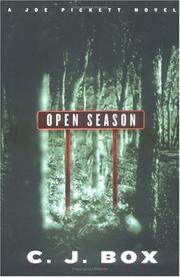For the time being, I am firmly planted in Congested Suburbia, USA, because
1. I need my job
2. My husband needs his job.
I am the Library Media Specialist (fka "librarian") in an elementary school in a very large suburban school district. The position of LMS has been eliminated with alarming regularity in a number of districts nationwide, and I don't relish moving to Open Spaces, American West where my position might be a year-to-year gamble at best. But I have discovered a mystery series that lets me live, if even for a few hours, in the wide open spaces of Wyoming, imagining a place where human settlement is dwarfed by the sheer magnitude of the land.
I happened upon the Joe Pickett series by C. J. Box while searching for an audiobook for my car time. Since I was at the mercy of what was available for free through our public library, I began with the sixth book in the series,
In Plain Sight. I thoroughly enjoyed the strong sense of place, the compelling plot, and the three-dimensional characters. I immediately started reading the series in order, beginning with the first book,
Open Season.
After doing so, I would impress upon others the importance of reading the series in order. Without revealing too much, I will admit that having listened to
In Plain Sight first, I knew how some situations were going to turn out in earlier books. This knowledge wasn't enough to spoil the other books, but I didn't feel the full impact of the events.
C.J. Box has created a most believable character in Joe Pickett, a game warden in fictional Saddle String, Wyoming. Joe is far from perfect, and he sometimes suffers from errors in judgment, but this makes him more real to the reader. Box also brings in environmental and conservation topics, and he does a fine job of showing the reader that there are very few pure black and white areas in these issues. The shades of gray often provide fodder for many plot twists.
There are few series where I try to have the next installment in hand before turning the last page of the current book, but this is one of them. If you are longing for a literary escape to the West, try C.J. Box.

